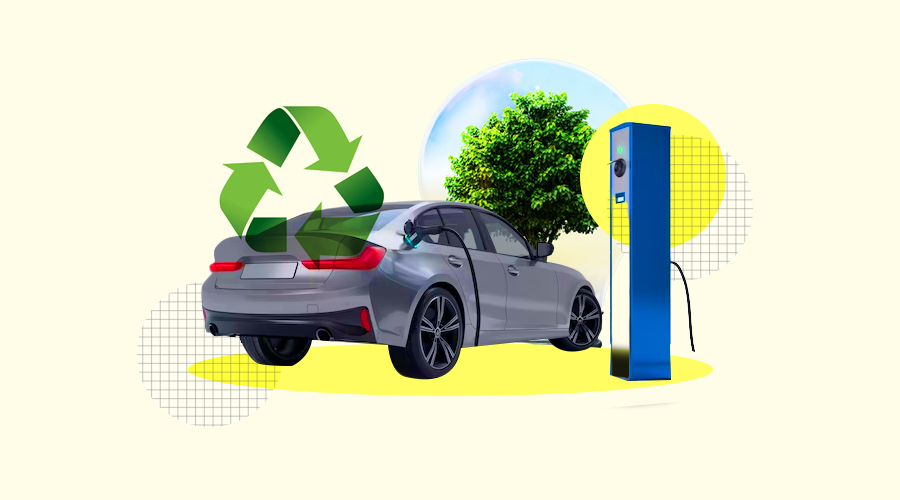The automotive industry has changed a lot in recent years, with an increased focus on environmentally friendly and sustainable transportation options. One of the most exciting new developments is the rise of electric vehicles (EVs). These cars will not only change the way we travel, but they will also have a significant impact on air quality. This study examines the relationship between electric vehicles and air quality, examining the pros and cons of large-scale adoption of electric vehicles.
1. The Road to Electric Mobility:
People are turning to electric vehicles due to the urgent need to protect the climate, especially from air pollution and greenhouse gas emissions. Air pollution is largely caused by conventional combustion engine vehicles, which release harmful pollutants such as nitrogen oxides (NOx), particulate matter (PM), and carbon dioxide (CO2) into the air. Electric cars, on the other hand, use electric motors powered by rechargeable batteries. This means that electric cars do not cause pollution while driving.
2. Clean Air and Public Health:
Poor air quality is a major public health problem as it is directly linked to lung disease, heart problems, and even premature death. Smog and other indicators of poor air quality are largely caused by pollution from cars and trucks, which are mainly found in cities. Letting people drive electric can solve these problems by reducing the amount of pollution released into the air.
3. No Pollution:
The biggest advantage of electric cars is that they do not emit any pollution into the air. Electric cars get their energy from energy instead of from fossil fuels like regular cars. They do not pollute the environment while running. Because they are electric, they are a good option for cities with air quality problems, as switching to electric vehicles can significantly reduce pollution in these places.
4. Changes in Greenhouse Gas Emissions:
Electric cars can help clean the air in cities, but their impact on the environment doesn’t stop there. One of the important ways to combat climate change is to reduce greenhouse gas pollution, especially carbon dioxide. Electric cars are better for the planet because the electricity they need to charge can come from renewable sources. To fully understand how electric vehicles impact the overall environment, it is important to understand their life cycle emissions, including those produced in the production of vehicles and batteries.
5. Problems and Solutions:
Electric vehicles have several advantages, but some issues need to be addressed before they can be widely used. The infrastructure of charging stations is one of the most important problems. To reduce range concerns and promote electric vehicle adoption, both public and private organizations must invest in building robust charging infrastructure.
Another important thing to consider is the impact of making and disposing of batteries on the planet. Scientists and engineers are working to improve batteries, finding ways to make them hold more energy, and finding ways to use safe materials to build them. Recycling programs for used batteries are also developing, intending to reduce the environmental damage caused by electric vehicle batteries.
6. Government Policies and Programs:
The future of electric transportation will largely be determined by governments around the world. Regulatory systems, incentives, and subsidies can encourage more people to buy electric vehicles. Electric cars now make up a large part of the market in countries such as Norway and the Netherlands, where policies have struggled to get people to buy electric cars.
Investing in public transport, cycle paths, and pedestrian-friendly urban planning can also help with the shift to electric vehicles, creating a complete plan for clean and sustainable urban transport.
7. Impact On the Economy:
The electric car industry has the potential to transform the economy by creating new jobs and encouraging new ideas. As the electric vehicle market grows, there will be more research and development, production, and maintenance of electric vehicle technologies. Companies and governments that support this change will save money and help clean the planet at the same time.
8. The Future of Electric Vehicles:
The future of electric mobility looks bright, but everyone needs to work together to make it happen. Electric vehicles are becoming increasingly popular due to changes in consumer behavior, better technology, and laws that support these vehicles. As the automotive industry undergoes a paradigm shift, it is important to prioritize the health and sustainability of the planet.
Conclusion
Electric vehicles are a breath of fresh air when it comes to finding clean and environmentally friendly ways to get around. Electric vehicles are becoming an important part of the fight against climate change as they can clean the air and reduce greenhouse gas pollution. As the world moves towards a greener future, the success of electric vehicles will depend on how well governments, businesses, and individuals work together. Adopting electric transportation is not just an option; We have a responsibility to create a healthier, cleaner, and more stable world for future generations.
FAQs
1. What is an electric car and how does it differ from a regular car?
Electric vehicles, also called electric vehicles (EVs), use electric motors powered by rechargeable batteries. Unlike regular cars with combustion engines, electric cars do not emit pollutants into the air through their exhaust pipes.
2. What impact do electric vehicles have on the air?
Electric cars are good for the environment because they do not cause pollution while driving. This helps reduce air pollution such as nitrogen oxides (NOx) and particulate matter (PM), improving air quality, especially in cities.
3. Will electric cars make the climate worse?
Although electric cars do not cause pollution during use, it is important to consider the entire life cycle, including the production of the car and the battery. The impact on the environment depends on the type of energy used to generate electricity and on advances in environmentally friendly production methods.
4. What are the main pollutants created when people use electric vehicles?
Electric vehicles emit far fewer pollutants, such as carbon dioxide (CO2), nitrogen oxides (NOx), and particulate matter (PM), that are typically emitted by combustion engine vehicles.
5. Will many people have problems buying an electric car?
Yes, some of the issues include the need for a strong charging network, concerns about battery production and scrapping, and possibly putting too much pressure on the electricity grid. To make the transition to electric vehicles easier, governments, businesses, and people must address these issues.
6. What steps can states take to get more people buying electric vehicles?
To encourage people to buy electric cars, governments can set incentives, subsidies, and regulations. Investing in charging stations, funding research and development, and developing policies to incentivize these activities are all important ways to accelerate the transition to electric mobility.

